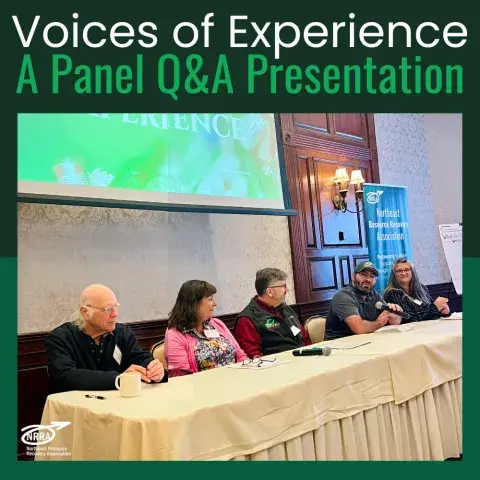
The Voices of Experience Panel was a hit at this year's NRRA Annual Meeting. Five participants with extensive experience in the industry shared their perspectives on a variety of questions and their answers were just too good to keep to ourselves!
The panel consisted of: Mark Richardson, Board Treasurer and retired Transfer Station Coordinator for the Town of Hampton, NH; Joan Cudworth, Board President and Director of Public Works for Hollis, NH; John Fay, Board Member and Programs Manager for the Windham Solid Waste Management District in VT; Brian Patnoe, NRRA Member Services Manager; and Tara Albert, SWOT Training and Certification Coordinator for NHDES.
The panel reflected on several questions including:
How has the solid waste field changed from when you started compared to now?
Respondents noted the move from using cash registers at the transfer station to now adopting credit card machines and the advent of recycling ("back then everything went into the trash, including BIG TVs!"). Nowadays, operators face concerns such as integrated lithium batteries, the need for resident education, and the need for some transfer stations to join the modern world with basics such as bathrooms and broadband internet.
What is the oddest thing you’ve seen a resident bring to your facility?
What was old was new again! Operators reported finding books from the 1700s, old letters, photos, and even money! Some treasures came home, such as the pencil sharpener from the 1800s Brian found after a resident cleaned out their family home and the 1853 musket from the Civil War that Mark was excited to claim. There was also the Skippy jar of mercury (yikes!), human ashes, and the "practice explosive" that made its way to a metals recycling vendor - all of which required phone calls to NHDES. There were the boxes accidentally thrown away from a law office that were part of a $2 million lawsuit (they were recovered!) and what was only described as an "angry houseplant." Perhaps the strangest one of all, though, was the partially-eaten jar of mayonnaise that was left on the "still good" table at one transfer station and, much to the operators surprise (and perhaps, horror) it was actually picked up and brought home by another resident!
What advice would you give a new operator in the field?
Unsurprisingly, most of the advice centered around talking and listening to residents while remaining patient and kind. As one panelist noted, "They don't live and breathe trash like we do." The industry is always changing, and it can be hard for residents to keep up. One-on-one resident education is always helpful, and you can follow up with digital resources. Operators are a critical link between residents and the recycling and solid waste management markets and industry.
Panelists also noted how dangerous the job can be, so it's important to pay attention and expect the unknown. Visiting other transfer stations can be an incredibly helpful way to see things done differently and to bring new ideas back to your facility. It's also important to know the rules and know your facilities' operating plan. Finally, operators should know where your recyclables are going to and what they are being turned into, so they can share accurate information with residents and help combat recycling myths.
What is one thing you wish every municipal solid waste facility operator or recycling program decisionmaker knew?
Panelists agreed that it's extremely important for decisionmakers to listen to their boots-on-the-ground operators so they both understand what their decisions will mean AND be prepared to stand by those decisions. The best way to do this is to spend a day at the Transfer Station working side-by-side with operators, seeing and hearing all that operators work with each day. Panelists also stressed the importance of the transfer station and recycling budget, noting that it's one that should not be cut - it's far too vital to the community and their residents.
What advice do you have about how to effectively educate residents about recycling?
When it comes to recycling education, panelists encouraged operators to "think outside the box!" It can be helpful to show people where their waste should go. For instance, Joan shared an experience of helping to redirect small appliances that residents were originally going to throw in the trash to a metal and electronics recycling pile that was clearly marked and on display. By seeing what objects were being diverted, Joan was able to help her town increase their metal and electronics recycling when residents were able to recycle better.
Panelists also stressed the importance of talking about the "why" behind recycling. Operators should also have a firm understanding of how their own recycling program works and why it may differ from neighboring communities. Finally, knowing what happens to material once it's been recycled and having the support of local decisionmakers is key.
